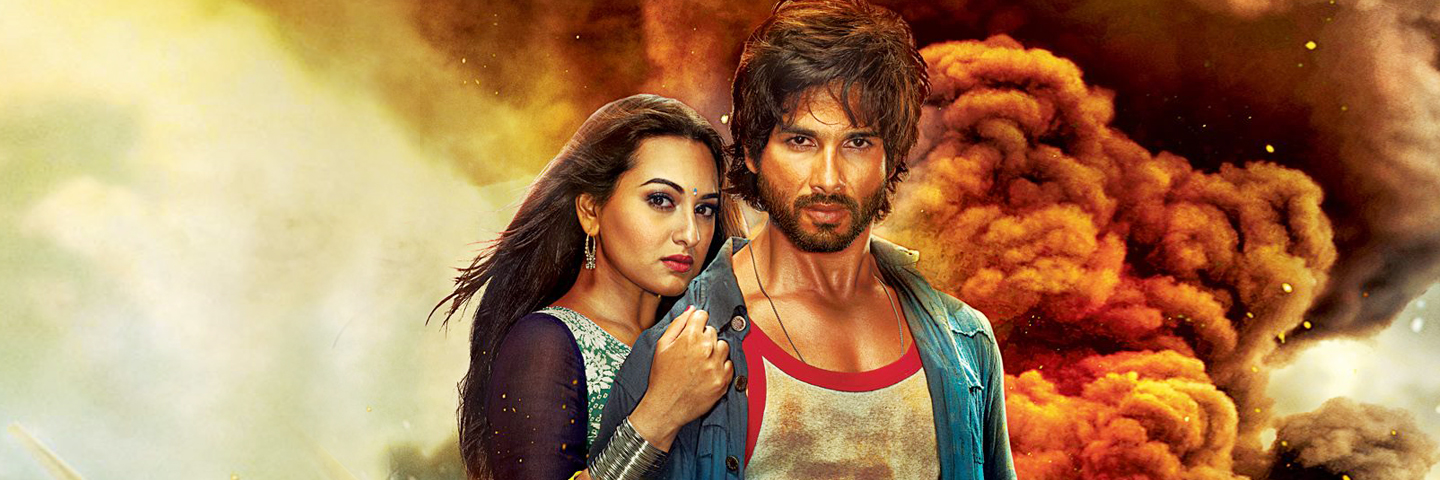Music: Pritam
Lyrics: Mayur Puri, Ashish Pandit, Neelesh Misra & Anupam Amod
Music Label: Eros Music
Expectations:
A Prabhu Deva film without music to dance to would like akin to a Rohit Shetty film sans action or a David Dhawan film minus comedy. With a track-record of Sajid-Wajid's Wanted and Rowdy Rathore, the director-choreographer now hooks up with Pritam. The film stars Shahid Kapoor, in whose films (Jab We Met, Kismat Konnection, Dil Bole Hadippa!, Badmaash Company, Mausam, Phata Poster Nikhla Hero), Pritam has always delivered hit songs irrespective of the success or otherwise of the films. Result: high expectations from the two dance gurus and the music ace!
Music:
Pritam lets go with rare abandon in desi terrain. This is his most ethnic score - at least in a long, long while. And he seems to be enjoying the breaking of all fetters as he unleashes rhythm and desi thekas, firing on all cylinders!
The score begins with Mika-Kalpana Patowary's 'Gandi Baat', a dhol-rich foot-tapper that dresses up the vibrant melody with Indian strings and wind instruments to create its saucy ambience. The lyrics (Anupam Amod) are clever and talk about how a roadside Romeo tried to be good with the girl and is now fed up of being a nice guy to her!
There is a 'film version' (?) of the same song - cosmetically a shade quieter with Nakash Aziz and Ritu Pathak replacing Mika and Kalpana. Though the subdued tones do not go well with the spirit of the song (the composition resembles 'Dhating Naach' from Pritam's earlier-mentioned Phata Poster...) and Nakash does not have the rambunctious drawl of Mika, Ritu shines in her part, and one wishes that she has joined Mika in the other, more zesty version of the song.
'Saree Ke Fall Sa' (Nakash-Antara Mitra) finds Nakash turning into a wannabe Udit Narayan in voice quality and throw, but he carries off the song well in an era when Udit's rich voice is ignored for mysterious reasons: a good substitute is a good substitute! Antara Mitra sings with verve and the required punch.
Like the lead track, we see a seamlessly smooth flow and equation between the tune and the words in 'Saree Ke Fall Sa' too, which is again high on rhythm and energy. This is probably also the album's catchiest song, and the composition and beat linger in mind long after it is over. However, unlike 'Gandi Baat', which is hook-based, 'Saree Ke Fall Sa' has an old-world charm with the entire mukhda lingering on our lips.
The remix version of this song thus seems unnecessary as the original song is itself remarkably danceable, with Mayur Puri's lyrics possessing an element of fun throughout (Touch karke dil mera kyoon scratch kiya re / Kabhi chhod diya dil kabhi catch kiya re /Saree ke fall sa kabhi match kiya re).
The third song 'Mat Maari' (Kunal Ganjawala-Sunidhi Chauhan) is the wackiest number on the album, with Kunal bringing in uncharacteristic (for him) quirkiness in his singing. However, it is Sunidhi Chauhan who effortlessly dominates the song, though most of her portions are angry words like 'Shut up! ' and 'Arey mar jaake tu'. All that we can say after experiencing Sunidhi's mastery here is that the screen lost a terrific actor when she chose to go before the microphone!
The lyrics (Ashish Pandit) have a method in their craziness and Sunidhi (singing for Sonakshi) ends her portion with the word 'Khamosh! ' Sonakshi's father Shatrughan Sinha's well-loved trademark!
Lyricist Neelesh Misra writes the staid 'Dhoka Dhadi' (Arijit Singh-Palak Muchhal), the album's only conventional song, which also sounds the least like Pritam, except for a section that carries a hangover of 'Yeh Jawaani Hai Deewani. The lyrics conjure up some fragile imagery (Mere kaano mein kahin / Roshandaano se kahin /Chhanti teri aawaz hai), and the chorus hook 'Udd gaye tote re' sung by a husky chorus beautifully offset the main vocals.
However, the song definitely emerges as the weakest in the soundtrack in energy and punch.
We then come to the 'item' song 'Kaddu Katega' sung superlatively by Antara Mitra. Her initial nasal portions make her almost sound like Mamta Sharma, but she gives the erotic folk song a very individualistic tenor, helped by the rousing tune and rhythm and the unabashed words (Aabroo ke silaayi khulegi / Sharm ka bhi lifafa phatega). The lyrics by Ashish Pandit clearly demarcate how to stay on the right side of the thin line between naughty and sleazy. The tempo and orchestration are heady, making it a virally infectious beat to those partial towards desi raunch music!
A word about the chorus here: it's perfect for the song and blends North and South into one mad, crazy and relentlessly intoxicating package!
Overall:
A Prabhu Deva film is not one in which lyrics can be memorable and music of the classic variety. However, the desi thekas that adorn the score are a great respite from the designer techno sounds passing off as rural music even in small-town-based stories. The music may not be brilliant, but the sheer spirited abandon adds to the appeal of the masala entertainer and is sure to gain the film the initial eyeballs. A small hiccup for us but a major one for the singer: the inlay does not bill Palak Muchhal in 'Dhoka Dhadi'!


